#Attorney Client Privilege
Text
Attorney-Client Privilege - Pop Culture
Obviously fictional TV shows won’t get every legal detail correct.
I almost hate to use these 2 shows as an example, because aside from the glaring misrepresentation of establishing an attorney-client relationship and protected communications, these shows actually do a better-than-usual job of portraying law firm life.
However, handing an attorney a dollar or any denomination of money 💰 does absolutely NOTHING in terms of establishing a privileged relationship. It’s not a requirement to establish the relationship and benefit from the privilege.
Think about pro bono clients; aren’t their communications privileged? (Yes when the elements of privilege apply).
Also, establishing an attorney-client relationship does not make every conversation between that attorney and client privileged.
For a communication to be protected by attorney-client privilege, it must be:
-a communication between privileged parties / attorney and client;
-made in confidence (no 3rd parties present or in earshot);
-for the primary purpose of seeking legal advice from the lawyer.
Other discussions not related to legal advice are NOT protected.
I’d also be remiss not to mention the crime-fraud exception — something I’ve never heard Saul mention to a client and I’m an avid fan of the show — communications for the purpose of furthering of a crime or intended crime are NOT protected by #privilege, even if the #attorney wasn’t aware of the advice being sought for improper use.
Since the shows get so much right, I wanted to articulate the important parts that it didn’t.
*Many of you don’t know this but I used to have a pretty successful blog, “prime time crimes” or something along those lines where I wrote about broken laws in fiction tv shows. The writers of some of the shows were big fans & I really miss doing it and regret taking it down.
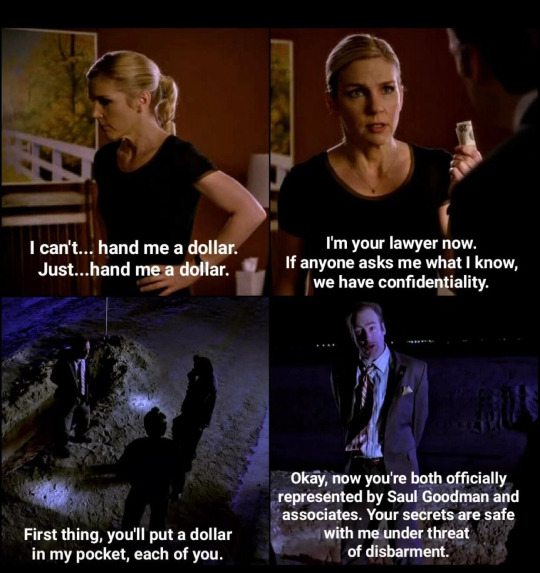
#better call saul#breaking bad#kim wexler#saul goodman#attorney client privilege#discovery#privilege#law#lawyer
11 notes
·
View notes
Text
Prosecutors in the special counsel's office have presented compelling preliminary evidence that former President Donald Trump knowingly and deliberately misled his own attorneys about his retention of classified materials after leaving office, a former top federal judge wrote Friday in a sealed filing, according to sources who described its contents to ABC News.
U.S. Judge Beryl Howell, who on Friday stepped down as the D.C. District Court's Chief Judge, wrote last week that prosecutors in special counsel Jack Smith's office had made a "prima facie showing that the former president had committed criminal violations," according to the sources, and that attorney-client privileges invoked by two of his lawyers could therefore be pierced.
Trump has repeatedly denied any wrongdoing in his handling of classified documents.
In her sealed filing, Howell ordered that Evan Corcoran, an attorney for Trump, should comply with a grand jury subpoena for testimony on six separate lines of inquiry over which he had previously asserted attorney-client privilege.
Sources added that Howell also ordered Corcoran to hand over a number of records tied to what Howell described as Trump's alleged "criminal scheme," echoing prosecutors. Those records include handwritten notes, invoices, and transcriptions of personal audio recordings.
In reaching the so-called prima facie standard to pierce Corcoran's privilege, Howell agreed prosecutors made a sufficient showing that on its face would appear to show Trump committed crimes. The judge made it clear that prosecutors would still need to meet a higher standard of evidence in order to seek charges against Trump, and more still to prove his guilt beyond a reasonable doubt.
"It is a lower hurdle, but it is an indication that the government had presented some evidence and allegation that they had evidence that met the elements of a crime," Brandon Van Grack, a former top national security official in the Justice Department who is now in private practice, told ABC News.
Howell found that prosecutors showed "sufficient" evidence that Trump "intentionally concealed" the existence of additional classified documents from Corcoran, sources said, putting Corcoran in an unwitting position to deceive the government.
It's unclear what evidence Howell may have reviewed under seal from both DOJ and Trump's attorneys to help her arrive at her decision.
In response to ABC News, a Trump campaign spokesperson said, in part, "Shame on Fake News ABC for broadcasting ILLEGALLY LEAKED false allegations from a Never Trump, now former chief judge, against the Trump legal team."
"The real story here, that Fake News ABC SHOULD be reporting on, is that prosecutors only attack lawyers when they have no case whatsoever," the spokesperson said.
A spokesperson for the special counsel's office declined to comment to ABC News.
The developments described by sources illustrate another dimension of the former president's ongoing legal vulnerabilities. As Smith's classified documents probe marches forward, prosecutors in New York are mulling a separate indictment against Trump over hush payments he allegedly paid to an adult film star ahead of the 2016 presidential election. Trump also faces scrutiny in Georgia over his efforts to overturn the 2020 presidential election in the state, and Smith is continuing his own probe into Trump's attempts to interfere in the 2020 election.
Central to Smith's efforts in the classified documents probe is determining whether lawyers who represented the former president falsely certified in response to a grand jury subpoena that Trump had returned all classified records to the government or whether Trump himself sought to conceal records that he might have unlawfully retained.
Federal prosecutors have claimed that lawyers for Trump certified in June 2022 that a "diligent search" of Trump's Mar-a-Lago estate turned up just 38 classified documents stored in a secured storage room. But two months later, when FBI agents raided the premises, they found more than 100 additional documents marked classified -- some of which were located outside of the storage room, including in Trump's office desk, prosecutors said.
In her order last Friday, Howell was unsparing in her criticism of Trump's actions since early last year in response to the governiment's attempts to retrieve all classified documents taken from the White House. At one point she described Trump's interactions with officials from the National Archives as a "dress rehearsal," sources said, for his later efforts at misdirection in response to the grand jury subpoena.
As ABC News has previously reported, investigators sought to compel the testimony of Corcoran and another Trump attorney, Jennifer Little, as part of their probe, citing the crime-fraud exception, which allows for attorney-client privilege to be pierced in cases where it is suspected that legal services were rendered in the commission of a crime. Sources told ABC News that Howell ordered Little's testimony as well, with the exception of one of the topics for which she sought to assert attorney-client privilege.
Sources said prosecutors have sought to question Corcoran on how he aided another Trump attorney, Christina Bobb, in drafting the June 2022 statement to the Justice Department, which Bobb ultimately signed.
Attorneys for Trump were expected to appeal Howell's Friday ruling, sources said.
#us politics#news#abc news#2023#donald trump#republicans#conservatives#gop#jack smith#special counsel#classified documents#classified documents probe#attorney client privilege#Judge Beryl Howell#Evan Corcoran#Brandon Van Grack#Jennifer Little#Christina Bobb
9 notes
·
View notes
Text
The Common Interest Privilege Against Disclosure – A Quick Legal Note
This note discusses the common interests privilege - a unique legal derivative of the attorney-client and work-product privilege from disclosure of information and documents under subpoena or discovery.
This note discusses the common interests privilege – a unique legal derivative of the attorney-client and work-product privilege from disclosure of information and documents under subpoena or discovery. The common interests privilege, also known as the joint defense privilege or pooled information privilege, is an exception to waiver of confidentiality after disclosure to technical third parties.…

View On WordPress
#andrew bernhard#attorney#attorney client privilege#bernhard law firm#common interest#common interest privilege#exception#florida#joint defense#joint defense privilege#lawsuit#pooled information#pooled information privilege#privileged material#third parties#waiver#work product privilege
0 notes
Text
https://apnews.com/article/black-lives-matter-los-angeles-police-department-raid-a9b11aa5ae7030606971e83bf2762cd3
After LA police raid home of Black Lives Matter attorney, a judge orders photographs destroyed
0 notes
Link
A Lawyer by Any Other Name is Still a Lawyer
A Lawyer is not a Super Adjuster
Barry Zalma
Aug 9, 2023
Read the full article at https://lnkd.in/gUuydwgC and see the full video at https://lnkd.in/gDfjAr75 and at https://lnkd.in/g23T5k8c and at https://zalma.com/blog plus more than 4550 posts.
NY USDC Eliminates Insurer’s Attorney Client Privilege
I became a lawyer in 1972. Before that I was an insurance adjuster and investigator. Since 1972 I have never been, nor acted as, an adjuster or an investigator. Of course, part of being a lawyer requires some investigation because failing to do so would be a breach of the fiduciary duty of a lawyer to his or her client.
I learned immediately upon entering law school, and later in the practice of law, that an attorney’s failure to investigate potential defenses constitutes a denial of effective assistance of counsel. [Owsley v. Peyton, 368 F.2d 1002, 1003 (4th Cir. 1966); Kibert v. Peyton, 383 F.2d 566, 569 (4th Cir. 1967); McLaughlin v. Royster, 346 F.Supp. 297 (E.D.Va.1972); Cf. Caudill v. Peyton, 368 F.2d 563 (4th Cir. 1966); Wood v. Zahradnick, 430 F.Supp. 107 (E.D. Va. 1977). In fact, as the Supreme Court of Oregon stated: “To fulfill the role assigned to defense counsel under our adversarial system of criminal justice, a lawyer must investigate the facts and inform himself or herself with respect to the law ‘to the extent appropriate to the nature and complexity of the case[.]’ Krummacher v. Gierloff, 290 Or. 867, 875, 627 P.2d 458 (1981),” [Burdge v. Palmateer, 338 Or. 490, 112 P.3d 320 (Or. 2005)]
The attorney-client privilege protects the client from disclosure of private communications with counsel. Communications from a lawyer to his client conveying legal advice and giving information to the lawyer to enable him to give sound and informed advice is always privileged. [Upjohn Co. v. United States, 449 U.S. 383, 390 (1981); M&T Bank Corp. v. State Nat’l Ins. Co. (W.D. N.Y. 2020). The investigation conducted by a lawyer as part of his or her duty to properly represent a client is the work of a lawyer and is, and should always be, protected by the attorney client privilege and the work product protection.
Some Privileges are More Equal Than Others
With regard to insurance matters some courts have ignored the duties owed by a lawyer to the client and have eliminated the attorney client privilege and the work product protection for most documents created by those lawyers who provide advice to insurers. For most of the more than 45 years I have been involved providing legal advice to insurers I have been accused of being a “super adjuster” rather than a lawyer to allow insureds to gain an advantage against an insurer, and gain access to the private legal advice given to the represented insurer. The attorney client privilege belongs to the client, not the lawyer, and can be waived by the client but not eliminated.
In Cadaret Grant & Co. v. Great American Insurance Company, No. CV 21-6665 (GRB)(AYS), United States District Court, E.D. New York (July 25, 2023) the USDC decided to compel an insurer to produce documents that include the legal advice provided by a lawyer to an insurer since it concluded that the lawyer involved with the requested documents was acting as an investigator or adjuster rather than as a lawyer.
The documents at issue revealed that as early as April of 2019, GAIC had retained outside counsel Graziano to discuss claims under the Bond. The USDC outlined the issue before it as follows: “New York courts are often faced with deciding claims of attorney-client privilege in the context of insurance coverage disputes. Central to such privilege decisions is the issue of whether outside counsel is performing the role of a claims investigator, or that of an attorney offering legal advice. Documents reflecting claims investigation activities are subject to discovery even if those activities were performed by an attorney.”
The Work Product Doctrine
The work product protection is the lawyer’s, unlike the attorney client privilege that applies to the client. Protection does not exist for documents that are prepared in the ordinary course of business or that would have been created in essentially similar form irrespective of the litigation.
The Decision
The Cadaret Grant & Co court refused to provide the attorney client privilege to documents created by the lawyer except a document that showed the lawyer, Graziano’s, legal analysis and opinions. It contains legal advice and the court concluded is therefore primarily legal, rather than investigatory in nature. It, and only it, was determined to covered by the attorney client privilege. The court was wrong and should be reversed if the insurer is able to seek appellate relief.
ZALMA OPINION
A lawyer giving legal advice to an insurer faced with a claim is required, to properly serve his or her client, to conduct a thorough legal investigation into the issues presented by the insurer for assistance and legal advice. That advice can include many different things, including suggestions for continuing investigation by the insurer, but none changes the lawyer into an investigator or a claims adjuster. Had counsel sat silent and only wrote a coverage opinion without using his or her skill, legal knowledge and training to obtain, directly or by asking for additional information, to prepare the coverage opinion that the court found was privileged but all other documents were not, is in error.
The Cadaret opinion is an insult to the lawyer who acted as a coverage lawyer. The lawyer needed to obtain sufficient information from the insurer client so that he or she could provide a thorough, well-reasoned and researched coverage opinion that was not within the ken of the insurance adjuster who had enough knowledge and experience to recognize that he or she needed the assistance and legal analysis of an experienced insurance coverage lawyer. The “super adjuster” theory that no investigative work of a lawyer can be part of the lawyer’s analysis that is protected by the attorney client privilege and/or the work product protection is simply in error and a false conclusion.
(c) 2023 Barry Zalma & ClaimSchool, Inc.
Please tell your friends and colleagues about this blog and the videos and let them subscribe to the blog and the videos.
Subscribe and receive videos limited to subscribers of Excellence in Claims Handling at locals.com https://zalmaoninsurance.locals.com/subscribe.
Consider subscribing to my publications at substack at https://barryzalma.substack.com/publish/post/107007808
Go to Newsbreak.com https://www.newsbreak.com/@c/1653419?s=01
Follow me on LinkedIn: www.linkedin.com/comm/mynetwork/discovery-see-all?usecase=PEOPLE_FOLLOWS&followMember=barry-zalma-esq-cfe-a6b5257
Daily articles are published at https://zalma.substack.comhttps://zalma.substack.com. Go to the podcast Zalma On Insurance at https://podcasters.spotify.com/pod/show/barry-zalma/support; Follow Mr. Zalma on Twitter at https://twitter.com/bzalma; Go to Barry Zalma videos at Rumble.com at https://rumble.com/c/c-262921; Go to Barry Zalma on YouTube- https://www.youtube.com/channel/UCysiZklEtxZsSF9DfC0Expg;
Go to the Insurance Claims Library – https://zalma.com/blog/insurance-claims-library\
#insurance#claims#insurance claims#lawyer#attorney#privilege#protection#attorney client privilege#work product protection#super adjuster#super investigator#lawyer is just a lawyer#insurance books#amazon.com
0 notes
Text
0 notes
Text
SEC Commissioner Signals Need to Fulfill Mandate of Sarbanes-Oxley Act and Develop “Minimum Standards” for Lawyers Practicing Before the Commission
SEC Commissioner Signals Need to Fulfill Mandate of Sarbanes-Oxley Act and Develop “Minimum Standards” for Lawyers Practicing Before the Commission
In remarks on March 5, 2022, on PLI’s Corporate Governance webcast, Commissioner Allison Herren Lee of the Securities and Exchange Commission stated that 20 years after its enactment, it is time to revisit the “unfulfilled mandate” of Section 307 of the Sarbanes-Oxley Act of 2002 and establish minimum standards for lawyers practicing before the Commission.1 Commissioner Lee, who announced that…

View On WordPress
#Allison Herren Lee#attorney client privilege#attorneys#capital markets#Finance Law#financial markets#PLI’s Corporate Governance webcast#Sarbanes-Oxley Act#SEC#SEC Commissioner#Securities Exchange Commission#Securities Law#securities lawyers
0 notes
Text



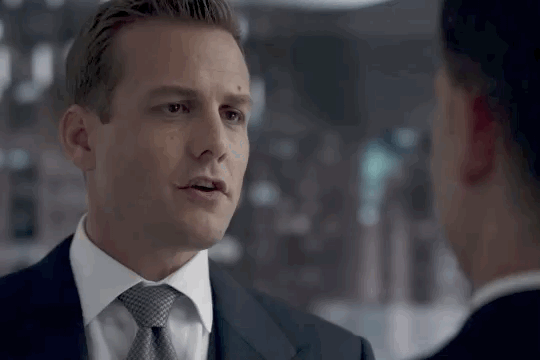
You bribed her. You bet your ass I did. But what you're too stupid to understand is I did it to save your ass. Get it through your goddamn head. You're not like other lawyers. You break attorney-client privilege, nothing different happens with Liam. But they're sure as shit gonna look into you. And we both know what they''re gonna find.
#harvey specter#mike ross#marvey#suits tv#suits usa#this was therapeutic#i love it when he says shut up gdi so sexy#btw i just watched an episode where harvey breaks attorney-client privilege to get mike out of prison so that's cool#mike's moral code
59 notes
·
View notes
Text
oh god i found an old like... moodboard thing from when i was developing kryptos' character for the flatland fic
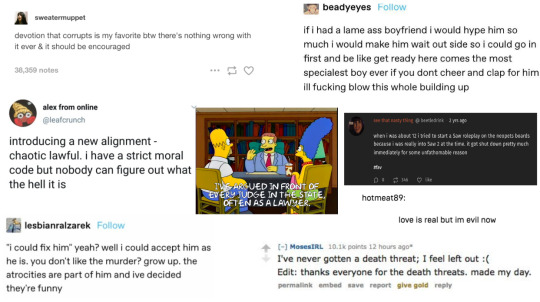
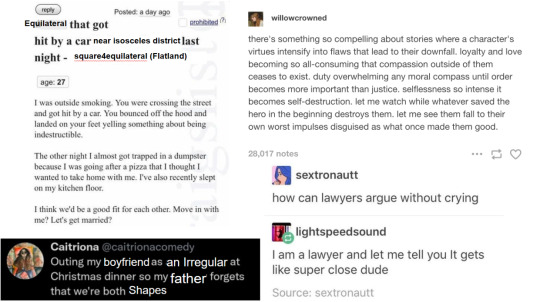
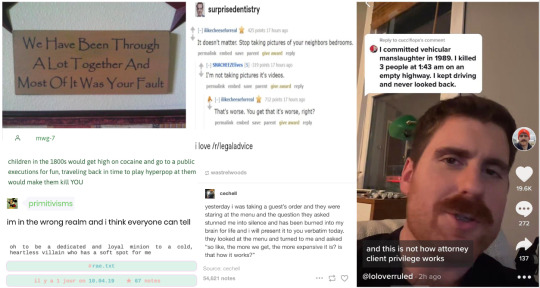
#some of these fit his current characterization better than others#but 'devotion that corrupts is my favorite btw there's nothing wrong with it ever and it should be encouraged' is the crux of his character#also i need to redraw that 'and this is not how attorney client privilege works' thing sometimes it makes me scream
11 notes
·
View notes
Text
Am I the only one who routinely thinks about the fact that Wesley was Isabel's lawyer in 1x07?
#that fact lives rent free in my head guys#RENT FREE#like. does tim know? have they talked about it?#did he already know westley when he and lopez got together?#or did westley go 'wait bradford like isabel?'#and if so did he ever tell him? or did he do his whole attorney client privilege thing?#SO MANY QUESTIONS#the rookie#wesley evers#isabel bradford#(also don't mind me misspelling his name through most of the tags. i don't have enough energy to fix it)
11 notes
·
View notes
Text
Every time one of my law professors talk about a paralegal’s duty to be bound by attorney client privilege, i just think about The Firm when Mitch McDeere telling the mobsters that hired him, he’s not legally allowed to snitch
#Nancy says some stuff#Law Tag#No because that was so smart of him actually and it's true#An Attorney can't just inform on their client without breaking the code of Ethics#the exception being that the client informed the attorney that they were actively going to commit a crime#And then went and comitted that crime#you'd have to inform on them#because you're duty bound as an officer of the court.#But like if your client tells you they did commit a crime/are guilty that's privileged information
14 notes
·
View notes
Text
Donald Trump dropped his initial claims of attorney-client privilege governing nearly 100 pages of documents seized at his Mar-a-Lago estate, but disputes about executive privilege remain for three records, according to a filing Monday from Trump and the Justice Department.
The disputes are what the special master, U.S. District Judge Raymond Dearie, aims to resolve while reviewing about 11,000 documents. FBI agents seized the records from Mar-a-Lago while searching for evidence of violations of the Espionage Act or obstruction of justice.
U.S. District Judge Aileen Cannon appointed Dearie to determine whether to withhold documents from the Justice Department's criminal investigation because they were personal records or fell under attorney-client privilege or executive privilege.
Trump withdrew his claims of attorney-client privilege for nine documents totaling nearly 100 pages, according to the joint filing from lawyers on both sides. Trump and government lawyers agreed the documents could be turned over immediately to investigators, according to the filing.
The joint filing Monday came after a dustup at a hearing Tuesday, when Dearie encouraged lawyers from both sides to determine where they truly disagree about the status of documents.
Government lawyers said in a filing Thursday that Trump contested nine documents as personal records, including two about immigration he argued also fell under executive privilege.
Six of the nine documents deal with clemency requests, two with immigration and one with a sports program at a military academy.
Trump's lawyers had said Friday the government's list "does not accurately reflect" the former President's position. Trump claimed three documents totaling 19 pages should fall under executive privilege, a policy to keep presidential communications confidential to invite candid advice from aides.
Dearie's review is scheduled to be completed Dec. 16.
#politics#us politics#donald trump#mar a lago#fbi#fbi raid#department of justice#judge aileen cannon#judge raymond dearie#special master#attorney-client privilege#executive privilege#2022
7 notes
·
View notes
Text
I am going to need people who don't know about the different types of law to stop trying to tell me what the firm I work for does and doesn't do just because it's listed on our website due to some partner or other handling a case adjacent to theirs & on the other side one time in 1996. I promise you I am not lying when I say we do corporate defense & don't take private cases, stop fighting me before I banish you to the full voice mail box of our business director
#personal#ma'am please do not ask who our clients are#i am fairly certain that attorney/client privilege makes that illegal#and even if its not i signed several documents saying to keep my mouth shut#i am not trying to get fired bc you want to fight me about us doing corporate defense
2 notes
·
View notes
Text
Clients and attorneys have privileged conversations that aren't meant to be shared outside of the two of them. When you use the Attorney-Client Privilege stamp to mark documents, you can ensure private files are kept separate from the documents that everyone in the office has access to.
0 notes
Link
No Privilege When Documents Placed in a Dispositive Motion
Routine Business Not Protected Work Product
Barry Zalma
Oct 31, 2023
Read the full article at https://lnkd.in/gAHWECZq and see the full video at https://lnkd.in/gKbEnqkg and at https://lnkd.in/gXuT8NUJ and at https://zalma.com/blog plus more than 4650 posts.
In Aerojet Rocketdyne, Inc. v. Global Aerospace, Inc., et al., No. 2:17-cv-01515-KJM-AC, United States District Court, E.D. California (October 25, 2023) an insurance coverage dispute wastes the time of the court and the litigators are admonished by the court.
FACTUAL BACKGROUND
In a long-running insurance coverage dispute that was prolonged for several years by defendant Global Aerospace Inc.’s refusals to produce evidence in response to requests from plaintiff Aerojet Rocketdyne, Inc. The root of the disagreement was Global’s assertion of attorney-client privilege and work-product protections.
The Magistrate Judge determined the disputed evidence was not protected by the attorney-client privilege or work product doctrine, and the court denied Global’s repeated requests to revisit that decision. In short, although attorneys were involved in the disputed investigation, communications with them were not privileged, and their work product was not protected; the investigation was part of the company’s routine business. It was not conducted in anticipation of litigation.
Several defendants, including Global, have now moved for summary judgment. Briefing is ongoing. The exhibits are excerpts of transcripts from two depositions marked “confidential” under the terms of a discovery protective order. The witnesses were Katherine Posner and Wendy Grossman, two attorneys at the center of the dispute about privilege and work product. The defendants argued the transcripts are “sensitive” and must be sealed because they “would ordinarily be protected by the attorney-client privilege and work product doctrine.”
The courts of this country recognize a general right to inspect and copy public records and documents, including judicial records and documents. Although that right is not absolute, a strong presumption in favor of access is the starting point. This presumption is based on the need for federal courts, although independent-indeed, particularly because they are independent-to have a measure of accountability and for the public to have confidence in the administration of justice.
When documents are filed with motions more than tangentially related to the merits of a case, such as alongside a motion for summary judgment, a party who asks to keep them secret must meet the high threshold of showing that compelling reasons that support that request. This standard applies even if the documents have previously been filed under seal or are covered by a generalized protective order, including a discovery-phase only protective order.
To decide whether the party requesting sealing has carried its burden, the court balances the requesting party’s reasons for secrecy with the public’s interests in disclosure. If a court decides to grant a request to seal, it must explain its reasons and may not rely on hypothesis or conjecture.
The District Court concluded that the defendants have not justified their request to seal the deposition transcript excerpts in question. They cannot rely on the confidentiality designation now. Once confidential discovery documents are made part of a dispositive motion, such as a motion for summary judgment, they lose their status of being raw fruits of discovery. They no longer enjoy protected status without some overriding interest in favor of keeping the discovery documents under seal.
DOCUMENTS UNDER SEAL
The District Court concluded that the defendants have no overriding interest in secrecy. They do not claim the testimony was privileged. They do not contend it discloses protected work product. They argue only that the testimony would “ordinarily” be privileged or protected, except that the court had decided they waived the attorney-client privilege with their outside counsel.
The argument suffers from two primary faults:
1. The court did not find the defendants waived the protections of any privilege or protection. The Magistrate Judge found the documents were not privileged and not protected, and this court upheld that decision. There was nothing to waive.
2. The defendants’ argument proves too much. If an unsuccessful privilege claim could support a motion to seal, then any defendant could keep any document from the public view simply by asserting a meritless privilege claim, waiting for that claim to be rejected, and asking to seal the document because it would “ordinarily” have been privileged. Any evidence could be kept from the public arbitrarily.
The deposition testimony may not be kept secret solely because it is specific to the particular claim at issue in the litigation. The argument undermines the motion. If the court were to grant summary judgment, and if the testimony were sealed, then the public could not read and understand the evidence behind the court’s decision why there was no genuine dispute as to any material fact.
Therefore, the motion to file under seal was denied. In addition, the court ordered that within seven days, defendants must either (1) file a notice withdrawing their reliance on Exhibits AAAA and BBBB in connection with their pending motion for summary judgment, or (2) file copies of Exhibits AAAA and BBBB on the public docket.
THE WARNING
The court and the parties have already devoted too much time, too much money, and too much effort to arguments about privilege and work product protections. As before, the court warns defendants that “dilatory or evasive tactics may result in an order to show cause why sanctions should not issue.”
ZALMA OPINION
There is nothing that annoys a trial judge more than repeated motions asserting privileges that do not exist yet wish to use the documents to support a dispositive motion. Insurance disputes should be relatively straightforward based upon clear and unambiguous wording of an insurance policy as applied to the facts supporting the dispute. Years of disputes over discovery of facts that the court repeatedly ruled were not privileged is contumacious and if continued the warning from the court should result in the sanctions predicted.
(c) 2023 Barry Zalma & ClaimSchool, Inc.
Please tell your friends and colleagues about this blog and the videos and let them subscribe to the blog and the videos.
Subscribe to Excellence in Claims Handling at locals.com at https://zalmaoninsurance.locals.com/subscribe or at substack at https://barryzalma.substack.com/publish/post/107007808
Go to Newsbreak.com https://www.newsbreak.com/@c/1653419?s=01
Follow me on LinkedIn: http://www.linkedin.com/comm/mynetwork/discovery-see-all...
Daily articles are published at https://zalma.substack.com.
Go to the podcast Zalma On Insurance at https://podcasters.spotify.com/pod/show/barry-zalma/support; Go to Barry Zalma videos at Rumble.com at https://rumble.com/c/c-262921; Go to Barry Zalma on YouTube- https://www.youtube.com/channel/UCysiZklEtxZsSF9DfC0Expg; Go to the Insurance Claims Library – http://zalma.com/blog/insurance-claims-library
Please tell your friends and colleagues about this blog and the videos and let them subscribe to the blog and the videos.
Go to Newsbreak.com https://lnkd.in/g8azKc34;
Subscribe to substack at https://lnkd.in/gcZKhG6g; Go to Newsbreak.com https://lnkd.in/g8azKc34
Go to Newsbreak.com https://lnkd.in/g8azKc34
Go to the Insurance Claims Library – https://lnkd.in/gwEYkxD
#insurance#claims#insurance claims#privilege#protection#work product#attorney client#insurance books#amazon.com
0 notes